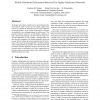Free Online Productivity Tools
i2Speak
i2Symbol
i2OCR
iTex2Img
iWeb2Print
iWeb2Shot
i2Type
iPdf2Split
iPdf2Merge
i2Bopomofo
i2Arabic
i2Style
i2Image
i2PDF
iLatex2Rtf
Sci2ools
111
click to vote
ICNP
2003
IEEE
2003
IEEE
Mobile Distributed Information Retrieval for Highly-Partitioned Networks
We propose and evaluate a mobile, peer-to-peer Information Retrieval system. Such a system can, for example, support medical care in a disaster by allowing access to a large collections of medical literature. In our system, documents in a collection are replicated in an overlapping manner at mobile peers. This provides resilience in the face of node failures, malicious attacks, and network partitions. We show that our design manages the randomness of node mobility. Although nodes contact only direct neighbors (who change frequently) and do not use any ad hoc routing, the system maintains good IR performance. This makes our design applicable to mobility situations where routing partitions are common. Our evaluation shows that our scheme provides significant savings in network costs, and increased access to information over ad-hoc routing-based approaches; nodes in our system require only a modest amount of additional storage on average.
ICNP 2003 | Network Protocols | Node Mobility | Peer-to-Peer Information Retrieval | Support Medical Care |
Related Content
| Added | 04 Jul 2010 |
| Updated | 04 Jul 2010 |
| Type | Conference |
| Year | 2003 |
| Where | ICNP |
| Authors | Katrina M. Hanna, Brian Neil Levine, R. Manmatha |
Comments (0)

